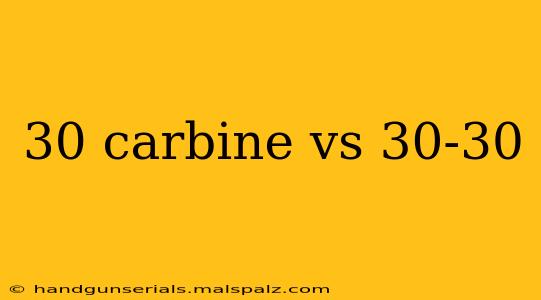Choosing the right cartridge can make or break a hunting trip or a day at the range. Both the .30 Carbine and the .30-30 Winchester are popular choices, but they cater to different needs and have distinct characteristics. This in-depth comparison will help you understand the key differences to determine which caliber best suits your requirements.
Caliber Overview: .30 Carbine vs. .30-30 Winchester
While sharing a similar name and a .30 caliber designation, the .30 Carbine and the .30-30 Winchester are vastly different cartridges. The core distinctions lie in their size, power, intended use, and available platforms.
.30 Carbine: A Concise History and Characteristics
Developed during World War II for the M1 Carbine, the .30 Carbine is a relatively low-powered cartridge. Its smaller size and lighter recoil make it easy to handle, contributing to its popularity for both military and civilian applications. Key characteristics include:
- Low recoil: Ideal for beginners and smaller-statured shooters.
- Subsonic ammunition availability: Useful for suppressed shooting.
- Maneuverability: Easy to carry and handle in close-quarters situations.
- Shorter range: Effective at closer ranges, typically under 200 yards.
- Limited stopping power: Not ideal for large game hunting.
.30-30 Winchester: A Legacy of Hunting Power
The .30-30 Winchester, introduced in 1895, is a legendary lever-action cartridge renowned for its hunting prowess. Its longer case and heavier bullet deliver significantly more energy than the .30 Carbine. Key features include:
- Greater stopping power: Effective for medium-sized game hunting.
- Longer range: Accurate and effective out to approximately 250-300 yards, depending on the ammunition and rifle.
- Stronger recoil: Requires more practice and proper technique.
- Variety of bullet weights and designs: Offers choices for different hunting situations.
- Established track record: Proven effective for generations of hunters.
Head-to-Head Comparison: Key Differences
| Feature | .30 Carbine | .30-30 Winchester |
|---|---|---|
| Power | Low | Medium to high |
| Recoil | Low | Moderate to high |
| Range | Short (under 200 yards) | Medium (250-300 yards) |
| Stopping Power | Limited | Significant |
| Intended Use | Target shooting, self-defense, small game | Deer hunting, medium-sized game hunting |
| Typical Platforms | M1 Carbine, various semi-automatic rifles | Lever-action rifles, bolt-action rifles |
| Ammunition Cost | Generally lower | Generally higher |
Choosing the Right Cartridge: Your Needs Matter
The best cartridge for you depends entirely on your intended use.
-
Choose .30 Carbine if: You prioritize low recoil, ease of handling, and are looking for a cartridge for target practice, self-defense (in appropriate situations), or small game hunting at close ranges.
-
Choose .30-30 Winchester if: You need more stopping power and longer range for medium-sized game hunting and are comfortable with more recoil.
Beyond the Basics: Ammunition Considerations
Both calibers offer a variety of ammunition options, including jacketed hollow points, full metal jacket, and soft point rounds. Researching different ammunition types and manufacturers will further refine your understanding of each cartridge’s capabilities.
Conclusion: Making an Informed Decision
The .30 Carbine and .30-30 Winchester serve distinct purposes. By carefully considering your needs and understanding their key differences, you can choose the cartridge best suited for your shooting or hunting activities. Remember to always practice safe firearm handling techniques.

